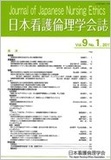Japanese
English
- 販売していません
- Abstract 文献概要
- 参考文献 Reference
看護学が生来的にもっている規範および倫理の課題を明らかにし、その発展に有効な倫理理論選択への示唆を得ることを目的とした。Notes on Nursingにおけるoughtを用いた記述から、ナイチンゲールの認識に基づく八つの看護の規範が導出された。さらにそれらは行動的規範と、認識的規範に分類された。行動的規範はナースの行為に関する規範で、生命倫理の原則の一部が含まれていた。認識的規範は、科学的認識や管理的認識を含むナースの専門性に関する認識であり、ナースの行為の根拠となるものであった。しかし、道徳的行為の根拠となる倫理的思考法の原型は認められなかった。さらに、規範とlawとの関連は、ナースが神の法則に従いながらも健康を実現するために自律した管理行動をとることを示していた。徳倫理には司法看護領域に適用困難があり、義務論を許容する現代功利主義を検討の視野に入れることも必要と考えられた。
This study aims to identify normative principles and related ethics issues intrinsic to traditional nursing science, and explore suggestions from this to choose an appropriate ethics theory, which could assist in developing a responsible nursing ethics. Eight basic norms, based on Florence Nightingale's understanding of nursing, were derived from a text analysis of Notes on Nursing, where we identified passages with ‘ought’ as ethics index items. The eight norms may be classified into two groups: behavioral and cognitive. The behavioral norms concern nursing activities, including some bioethics principles. The cognitive norms are concerned with nursing as a specialty related to scientific and managerial issues in nursing. Cognitive norms can provide nurses with a basis for common nursing practices. However, neither provide a basis for ethical thinking about morally responsible behaviors. Further, the relations between norms and laws in the text suggest that other than relying on the laws of God, nurses should be autonomous in managerial activities to improve patient health. Virtue ethics is unsuitable for forensic psychiatric nursing practice. Owing to its universalizability, the most suitable ethics theory to supplement moral principles in nursing needs to be utilitarian and thus one that includes deontology.
Copyright © 2017, The Japan Nursing Ethics Associatin. All rights reserved.


